Listen to this article on the go below:
If dieting actually worked, we’d all be walking around with green smoothies in hand, glowing like those ridiculously spray-tanned TikTok influencers, loving every second of life!
If you’re here, you’ve probably tried ALL the diets, and… you know they kinda suck.
From cleanses to cutting carbs, diet culture has sold us every magic bullet, only for it to backfire. Every. Single. Time.
So, if you’re tired of counting points, avoiding bread like the plague, or feeling like your self-worth is tied to what you ate for breakfast, it’s time to say goodbye to dieting for good.
If you don’t know me yet, I’m Marissa, a non-diet dietitian, and I’m here to help you enjoy pizza AND reclaim salad as something delicious rather than “diet food,” all without feeling like you need to “earn” your meals.
In this blog post, I’ll cover why diets fail, what a non-diet dietitian does differently, and how you can build lasting, healthy habits without the pressure of weight loss.
By the end, you’ll understand how to nourish your body, enjoy all foods, and break free from the endless cycle of dieting.
Let’s start things off with an explainer of why diets fail. Good news: it was never your fault.
A reminder: why diets fail
For decades, we’ve been told by Jenny Craig, WW, and endless influencers that with enough willpower and the right diet, we can achieve permanent weight loss (and your dream life, to boot).
But the scientific research paints a completely different picture.
While the initial excitement of a new diet often feels like “it’s working,” especially if you’re losing weight, that can quickly fade as it becomes impossible to maintain. And then: the pounds return.
- Most studies show that dieting results in short-term weight loss, but within a year, the majority of people regain what they lost (source).
- This weight cycling is not a good thing! An article in the Medical Clinics of North America reports that “yo-yo dieting” can take a serious toll, both physically and mentally (source).
It’s not because of a lack of effort. Most people work incredibly hard at following the rules created by the diet industry.
But traditional diets are set up to fail. That’s because diets don’t actually address what’s lying underneath the iceberg of our relationship with food; instead, they just give us new rules to follow until we burn out.
So, what’s the alternative? That’s where a non-diet dietitian comes in.
What is a non-diet dietitian?
So, what exactly is a non-diet dietitian, and how is that different from the usual “eat less, move more” advice?
As a non-diet dietitian, I take a completely different approach to weight, health, and nutrition: your health is tied to your behaviors, not the number on the scale.
Why? Because it is possible to achieve (at least temporary) weight loss through unhealthy habits with restrictive diets.
As a non-diet dietitian, I will never promote a restrictive diet or center our work together strictly around weight loss as the primary goal (but I also won’t ignore your desire for weight loss – more on that in a sec).
Instead, we work on fostering sustainable habits. Think: mindful eating practices, nourishing your body, and enjoying movement.
Now, can these behaviors alter your weight? Sure.
But the idea is that we don’t force weight changes. Instead, we’re working on building healthy habits and changing long-held beliefs and attitudes about food, which can naturally lead to better health outcomes in the long run.
This is very different from traditional approaches like calorie counting or creating rigid meal plans.
Those methods often lead to burnout because they don’t address the larger picture: your relationship with food and how food fits into your life.
My work as a non-diet dietitian in today’s misinformation-infused world feels like a way to bring balance back to the force (sorry, we’re total Star Wars fans over here).
This isn’t just a feel-good idea; it’s backed by research.
People who adopt healthy behaviors without focusing solely on weight tend to have better long-term outcomes, both physically and mentally. This is called a weight-inclusive approach (source).
My goal isn’t to tell you to throw everything out the window that you know, on the contrary, I want to help you find what works best for you, without succumbing to rigid rules or constant food guilt.
But for those who struggle to follow meal plans, track calories, or adjust eating behaviors (P.S. that’s a lot of us), you’re not a “failure.”
You just need a different approach: one that doesn’t involve restricting all the foods you were told you couldn’t have.
The beauty of the non-diet approach is its flexibility: we meet you where you are and find the tools that work best for YOU.
Who would benefit most from working with a non-diet dietitian?
If you’ve ever felt like diets are an endless cycle of restriction followed by inevitable guilt when you “fall off the wagon,” you’re likely ready to work with a non-diet dietitian.
Non-diet dietitians know that diets are designed to be temporary, which is why they rarely work in the long run.
The non-diet approach, on the other hand, might be a better fit for you if you’re ready to step off that roller coaster.
It’s ideal for anyone who’s:
- Tired of counting points and calories
- Sick of tracking every gram
- Trying to resist “forbidden” foods
- Triggered by measuring your body weight
If you’re done with seeing food and your weight as something you have to control, the non-diet approach can help you rebuild trust with your body AND your natural hunger cues.
The non-diet approach is especially beneficial if:
- You’ve tried every diet, only to find yourself back at square one
- You’re ready to stop measuring your self-worth by the number on the scale
- You want to build healthy habits that stick without feeling like you’re constantly fighting your cravings
- You’re interested in a more balanced, enjoyable way of eating without the food guilt.
This approach doesn’t ask you to be perfect or follow a set of rigid rules. Instead, it focuses on progress and flexibility.
You’ll learn to tune into your body’s signals, make peace with all foods, and let go of the idea that you need to “earn” your meals.
Who is the non-diet approach NOT for?
While the non-diet approach is beneficial for many people, there are some populations for whom it might not be the best fit, at least initially.
- You have an acute medical condition that requires a specific prescriptive diet, such as kidney disease.
- You have a severe eating disorder that requires a higher level of care.
- You are an elite athlete with performance goals, although non-diet principles can still be integrated.
- You are having surgical weight loss (such as for a medical procedure or a personal reason).
The real benefits of working with a non-diet dietitian
Is it okay to toot my own horn? Toot toot! As a non-diet dietitian, I’ve seen incredible benefits from my clients, colleagues who practice similarly, and from published research.
I’ve witnessed firsthand how these benefits happen when people let go of dieting and embrace a healthier, more sustainable way of living.
My clients, many of whom grew up in the world of Weight Watchers, Atkins, and Jenny Craig, often come to me feeling skeptical. After years of counting points, measuring portions, and fearing carbs, the idea of doing something different seems almost too good to be true.
But let me share some of their stories (names changed for privacy) and what this approach really feels like.
Case study: dieting burnout
Take Sarah, for example. She had been dieting for as long as she could remember—trying everything from low-carb diets to juice cleanses. By the time she came to me, she felt exhausted and defeated. The weight would come off but always return, leaving her stuck in a cycle of guilt and shame.
Through our work together, Sarah learned to trust her body again. She began to notice when she was hungry, what foods made her feel energized, and how to enjoy a meal without obsessing over calories.
Today, she talks about how freeing it feels to finally enjoy eating without worrying about undoing her progress.
“For the first time in years, I can sit down with my family and enjoy pizza without stressing about how I will need to work it off tomorrow. It feels amazing,” she says.
Benefit: you’ll rediscover joy and ease with eating
For many people, food is a source of stress, guilt, and confusion. One of the biggest shifts my clients experience is the ability to reconnect with the joy of eating without feeling like it will wreck their health goals. Gone are the rigid rules, the anxiety over every bite, and the fear of “messing up.” Instead, you’ll find yourself looking forward to meals and enjoying your favorite foods without guilt.
Case study: cheat meals & weight fluctuations
Then there’s James, who had spent decades believing that weight loss was the key to his health and happiness. He came to me after years of strict weekday dieting followed by cheat meals on the weekends, leaving him trapped in a frustrating cycle of weight fluctuations and feeling stuck.
James was used to rigid meal plans and avoiding foods he loved, and he was good at doing this for some time, but then it would catch up with him, and he would regain weight.
After our work together, he learned to integrate foods like bread and pasta back into his life without overindulging.
“I never thought I could eat what I want and still feel healthy,” James told me. “Now, I feel more energized, my cholesterol has improved, and I’m not having cheat meals on the weekends anymore.”
Benefit: you’ll truly nourish your body
One of the key benefits of the non-diet approach is learning how to truly nourish your body. You’ll find that when you eat in a way that honors your hunger and provides the nutrients you need, you naturally feel more energized and satisfied. No more fatigue from extreme diets or guilt from “cheating.” You’ll learn how to balance meals in a way that works for your body and won’t feel the need to “get back on track every Monday.”
Case study: counting points
Meet Lisa, who had grown up in the world of Weight Watchers, where every meal came with a side of points. She told me how she used to save up her “points” for dessert, but it always felt like a constant battle with herself.
After working with me, Lisa shared this: “I no longer feel bad about having a cookie or ice cream. I know how to enjoy it and move on. No shame, no guilt, just feel more balanced.”
Benefit: you’ll have flexibility with eating and can enjoy treats without guilt or shame.
With the non-diet approach, there’s room for everything—including the foods you love. You’ll learn how to enjoy treats and special meals in a way that feels natural, without the emotional rollercoaster of guilt or the need to track every point and calorie.
Case study: scale dictating success
Then, there’s Maria, who spent most of her life tethered to the scale. Every morning, she’d weigh herself, letting that number dictate how she felt about herself for the rest of the day.
Through our work together, Maria realized that her self-worth wasn’t tied to a number. She shifted her focus to how she felt: her energy, her mood, and her ability to enjoy life again.
She also started working on behaviors that she felt she could control, realizing “weight” is not a behavior.
“I haven’t stepped on the scale in months,” she says. “And I feel so much lighter—mentally and emotionally.”
Benefit: you’ll shift your focus from the number on the scale to how you actually feel.
Instead of obsessing over the number on the scale, the non-diet approach encourages you to focus on building healthy habits that support your overall well-being. You’ll learn to trust your body, enjoy all foods, and feel empowered in your choices—without obsessing over every bite. This mindset shift can bring immense relief and allow you to live more fully.
Case study: emotional & binge eating
Finally, meet Emily. In her teenage years, she learned how food could help her numb and feel better about her life and self. It was a special place that, even though she knew it was unhelpful, was a hard cycle to break. When she got older and got married, at first, she wasn’t turning to food as much, but after having her second child and deciding to stay home, she found herself slipping back into emotional and binge-eating patterns. Being surrounded by food all day, managing stress, and not having the structure she thrived on left her feeling out of control.
“I used to feel like food was something I controlled, but now I feel like it’s controlling me,” she admitted. She realized that her anxiety was tied to her emotional eating and that without better coping mechanisms, her anxiety would continue to spiral.
Through our work together, Emily is learning to replace her all-or-nothing thinking with a healthier, more balanced approach to eating. She’s building skills to manage her anxiety without turning to food 24/7.
“I want to feel capable of handling my stress and anxiety without feeling like I’m sabotaging myself with food,” she shared. Emily is now working toward feeling strong and healthy, not just physically but mentally.
She reflected, “I’ve accomplished so much in my life, but this one piece—emotional and binge eating—felt like a failure. Now, I’m learning to live in the gray, where I don’t feel ashamed for eating a cookie or two, and I’m okay with my choices.”
As she regains her strength, Emily is also starting to feel confident in her body, and being the best role model for her kids.
Benefit: you’ll learn how to manage emotional eating
One of the biggest breakthroughs that clients like Emily experience is learning how to manage stress and anxiety without turning to food 24/7. The non-diet approach helps you develop healthier coping mechanisms so you can stop the cycle of bingeing and guilt and start feeling more in control of your choices.
Working with a non-diet dietitian doesn’t just help you stop dieting; it helps you find peace with food, reconnect with your body, and build well-rounded, healthier eating habits that last.
Real Life FAQ!
Below, I have shared actual questions (and fears) that I have received from my own clientele about diving into non-diet work.
Take a look!
What if I have a lot of weight to lose?
It’s completely understandable to feel concerned about your weight, especially if you’ve been told that losing weight is the ticket to a healthier, happier life.
As a non-diet dietitian, I do not dismiss your weight goals. I just don’t make weight the focus of our work together.
Instead, we focus on nourishing your body, improving your relationship with food, and creating long-term habits like balanced eating, movement, and self-care.
By doing this, you’ll not only feel better physically, but you’ll also reduce the stress and pressure that come with dieting.
You might even notice improvements in your energy, mood, and overall well-being regardless of what the scale says.
Key takeaway: While weight loss may happen as a natural outcome for some people, it’s not the primary goal, because losing weight doesn’t automatically guarantee healthier outcomes.
What if I have high cholesterol?
Working with a non-diet dietitian is incredibly effective in helping you manage your cholesterol.
Instead of cutting out entire food groups, we’ll work together to develop sustainable habits that support heart health, such as some ways that you can personally incorporate more fiber, healthy fats, and plant-based foods into your diet.
We’ll also look at other factors like stress, physical activity, and sleep, all of which play a role in heart health.
The best part is that I have seen my clients improve their cholesterol while still enjoying the foods they love. Healthy eating doesn’t have to mean giving up pleasure or satisfaction from your meals!
How would this work with diabetes?
Managing diabetes can feel overwhelming, but the non-diet approach can work for you.
While we would still be mindful of carbohydrates to help manage blood sugar levels, our goal isn’t to create rigid rules that lead to fear around food.
Instead, we focus on understanding how different foods affect your body and finding a balance that supports your blood sugar, while still allowing you to enjoy a wide variety of foods.
We’ll also develop flexible meal options that incorporate carbs in a way that feels sustainable and enjoyable.
You won’t need to obsessively count or eliminate carbs, instead, you’ll learn how to pair them with protein and healthy fats to keep your blood sugar steady and your meals satisfying.
Would you never give out a meal plan?
While I’m not a fan of rigid, one-size-fits-all meal plans, I do believe there’s a time and place for some structure, especially if it helps take the stress out of meal decisions.
Instead of giving you a restrictive meal plan that dictates every morsel of food, I prefer to guide you in creating flexible, personalized meal ideas that suit your preferences, lifestyle, and nutritional needs.
As an example, I might help you come up with a loose meal framework or suggest balanced options for different meals, but it’s always with the understanding that flexibility and enjoyment are part of your goals.
What if I’ve already tried intuitive eating?
If intuitive eating didn’t jive for you, that’s completely okay.
When we work together, we’ll focus on your individual experience and address any roadblocks you’ve encountered in the past.
Sometimes a little extra support can help you figure out what held you back in the first place and how to help you move forward in a way that feels sustainable and realistic for your life, whether it’s intuitive eating or something entirely different.
Bottom line: there is no right or wrong way to approach eating food; we can adjust the process to fit your unique needs and health goals.
Will I ever lose weight with a non-diet dietitian?
This is a question that I get a lot. While weight loss isn’t the primary focus of the non-diet approach, that doesn’t mean your body won’t change.
Some people may lose weight as a natural byproduct of building healthier habits, while others might maintain or even gain weight as their body finds its healthiest, most sustainable point.
The work we would do together would be to shift the focus away from weight as the only indicator of success and instead prioritize healthful behaviors that support your true health.
When you stop fighting against your body and start working with it, you’ll notice positive changes in how you feel: better energy, improved mood, less obsession with food.
And all of these can have a much larger impact on your long-term health than the number on the scale.
How can I trust my body when I feel so out of control around food?
I completely understand. If you’ve spent years dieting or restricting certain foods, it can feel scary to let go of those rules and learn to trust your body.
Many people worry that without strict control, they’ll overeat or choose “unhealthy” foods all the time. That’s why I have an article all about emotional eating. But, that feeling of being “out of control around food” often comes from restriction itself.
When we tell ourselves we CAN’T have something, it only makes us want it more.
Through our work together, we’ll learn to let those food rules and restrictions go. Over time, you’ll find that you can enjoy all foods without going overboard because they no longer have that forbidden allure.
P.S. This process doesn’t happen overnight…it can take time and patience, but as I like to tell my clients, I am not going anywhere until you start feeling better! And that includes feeling safe and at ease around ALL kinds of food.
Can the non-diet approach work with food sensitivities or allergies?
Absolutely! The non-diet approach helps you find what works for your unique body, and that includes managing food sensitivities or allergies.
Instead of seeing these kinds of foods as “forbidden” because of dieting rules, we would approach them with the understanding that these foods simply don’t work for your body, and that’s okay.
We’ll also ensure you’re getting the nutrients you need so that you don’t miss out on anything important, while creating balanced, enjoyable meals that don’t feel restrictive or stressful.
Is the non-diet approach still healthy if I don’t focus on weight loss?
Yes, 100%!
Health isn’t defined by a number on the scale. The non-diet approach is ALL about improving your health. That includes the three biggies: physical, mental, and emotional.
Focusing on health behaviors like nourishing your body, moving in ways that feel good, managing stress, and getting enough rest are all essential parts of health that don’t depend on weight loss.
Research shows that stopping yo-yo dieting in place of adopting healthy habits, regardless of weight, leads to better long-term outcomes (source), such as improved blood pressure, cholesterol, energy levels, and mental health.
You can feel better, live healthier, and thrive without fixating on the scale.
In truth, by letting go of the weight-loss pressure, you’re much more likely to develop habits that last and make you feel good in the long run!
How long does it take to see results with the non-diet approach?
The non-diet approach isn’t a quick fix, so you and I will set realistic expectations, together.
That being said, many people start to notice positive changes relatively soon, sometimes within weeks.
These changes might look different from traditional “results,” and will vary from one person to another.
- Some people might see improvements in labs over the course of a few months to a year
- While others may see improved energy levels, reduced stress around food, and a better understanding of hunger and fullness cues.
As for deeper changes, like feeling more confident in your food choices or fully trusting your body, that can take a bit more time.
The good news is, the results you DO get (e.g., better energy, less food stress, and a healthier relationship with eating) all impact the other results you might be looking for (e.g., sustainable, healthy eating behaviors, stable weights, better labs).
What if I have a history of disordered eating?
The non-diet approach is incredibly healing and supportive for someone like you!
Through our counseling sessions together, we’ll focus on repairing your relationship with food and your body and helping you move away from the restrictive and damaging patterns that come with disordered eating.
We will take things at your own pace. I provide guidance in a compassionate, non-judgmental way, ensuring you feel supported as you relearn how to trust your body.
Does the non-diet approach work with kids?
Yes!
The non-diet approach can be especially beneficial for kids as it helps them develop a healthy relationship with food from a young age. Because we are not food shaming, this can help to prevent future disordered eating and food struggles.
Kids are naturally born intuitive eaters, meaning they listen to their hunger and fullness cues without the diet rules that adults often impose on themselves.
The goal is to nurture their innate abilities instead of overriding them with our own ideas about how much they should or shouldn’t eat.
When working with kids, my goal is to help them
- Learn how to listen to their bodies,
- Develop the mantra that “every body is a good body,”
- Enjoy a wide variety of foods,
- Create positive habits that support their growth.
I help families do all of this in both my parent nutrition coaching calls and non-diet counseling work.
Parents play a huge role in modeling a healthy relationship with food, so I often work with families to create an environment where all foods fit, and teach everyone to stop labeling certain foods as “good” or “bad.”
This shift is powerful, as it helps kids enjoy all sorts of foods.
How to find a non-diet dietitian
Finding the right non-diet dietitian is an important step toward building a healthier relationship with food, but where do you start?
Well, ahem, if you’re in Washington State, you can start here by setting up a free 20-minute casual chat. I always check to see if I am able to counsel you in your state (due to licensing requirements), and if not, I refer you directly to a non-diet dietitian who can.
You can also look for dietitians who specifically mention the non-diet approach, intuitive eating, or Health at Every Size (HAES) in their practice. Many RDNs who follow this philosophy will often highlight it on their websites or social media.
You can also use directories like:
- The Intuitive Eating Counselor Directory (www.intuitiveeating.org)
- The Health at Every Size (HAES) Community (www.sizediversityandhealth.org)
- The Eating Disorders Registered Dietitian (EDRDPRO) Directory (www.edrdpro.com)
- The Academy of Nutrition and Dietetics’ website (www.eatright.org), where you can search for RDNs by location and filter based on specialties like intuitive eating and eating disorders.
Trying to find someone who feels like a good fit for YOU is the most important thing. This means looking for someone whose approach resonates with your values and who makes you feel supported and understood.
Many dietitians offer free consultations to assess “good fit,” so don’t be afraid to ask questions and see if their style aligns with what you’re looking for.
Recap: why a non-diet dietitian might be exactly what you need
One size fits no one.
Non-diet dietitians approach every client with a refreshing, sustainable alternative to the false promise of the dieting world.
Additionally, by shifting the focus from weight loss to building lifelong healthy habits, we help you finally break free from food rules, guilt, and the pressure to constantly control your body.
As a non-diet dietitian, I’m here to help you reconnect with your body, enjoy all foods without fear, and create a lifestyle that supports every part of your well-being: physically, mentally, and emotionally.
Whether you’re dealing with high cholesterol or diabetes or just want to feed your family better, the non-diet approach allows you to work with your body, not against it.
If you are ready to build lifelong eating habits with a non-diet dietitian, you can get started by visiting my contact page and scheduling an appointment. Looking forward to hearing from you 🙂

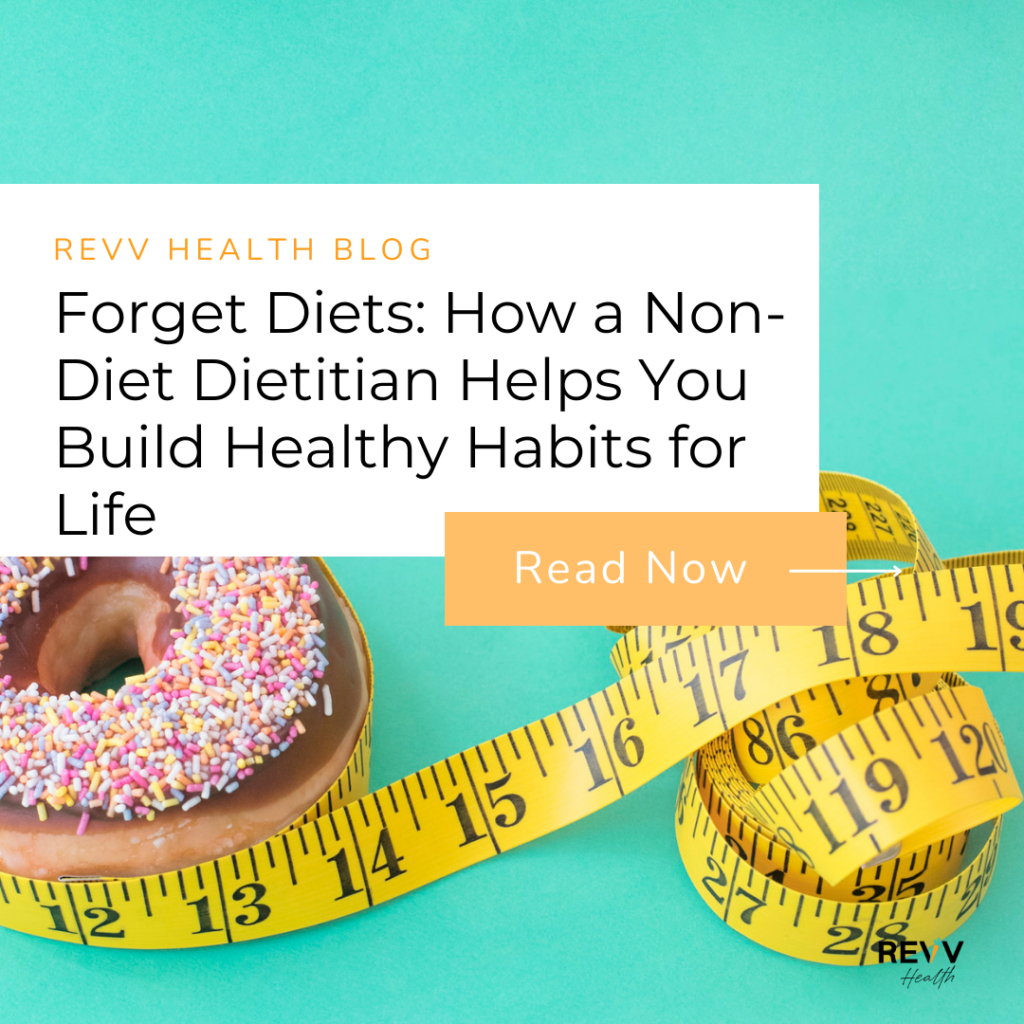
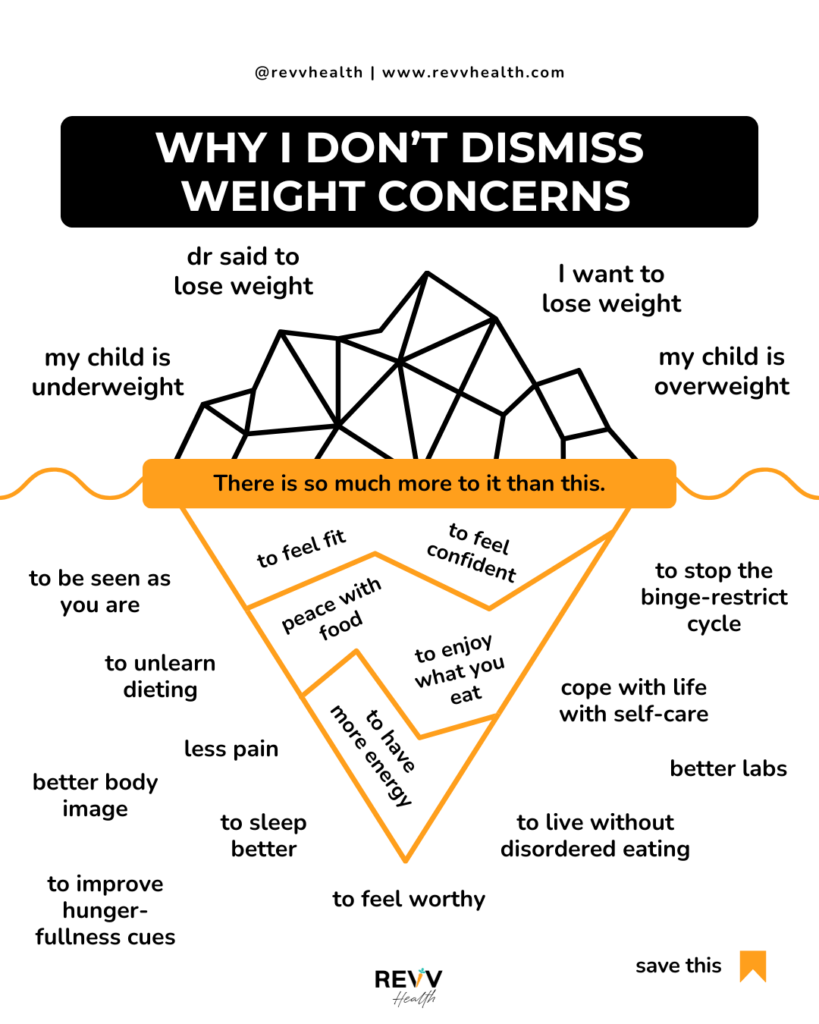

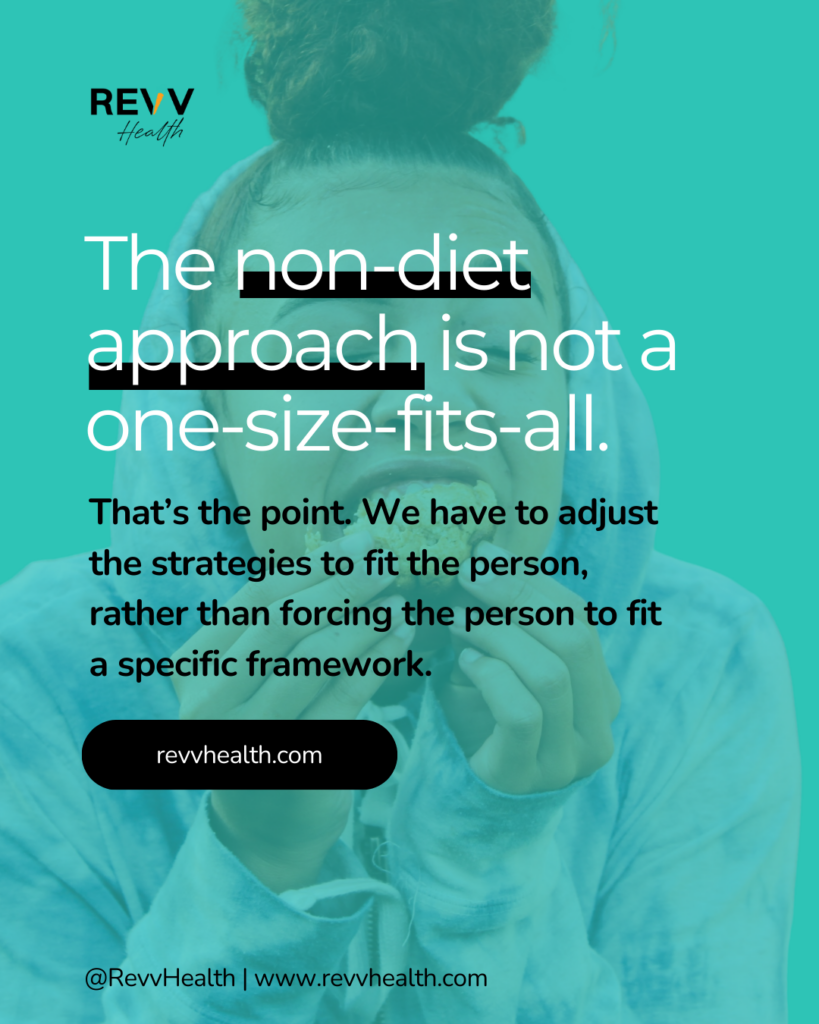
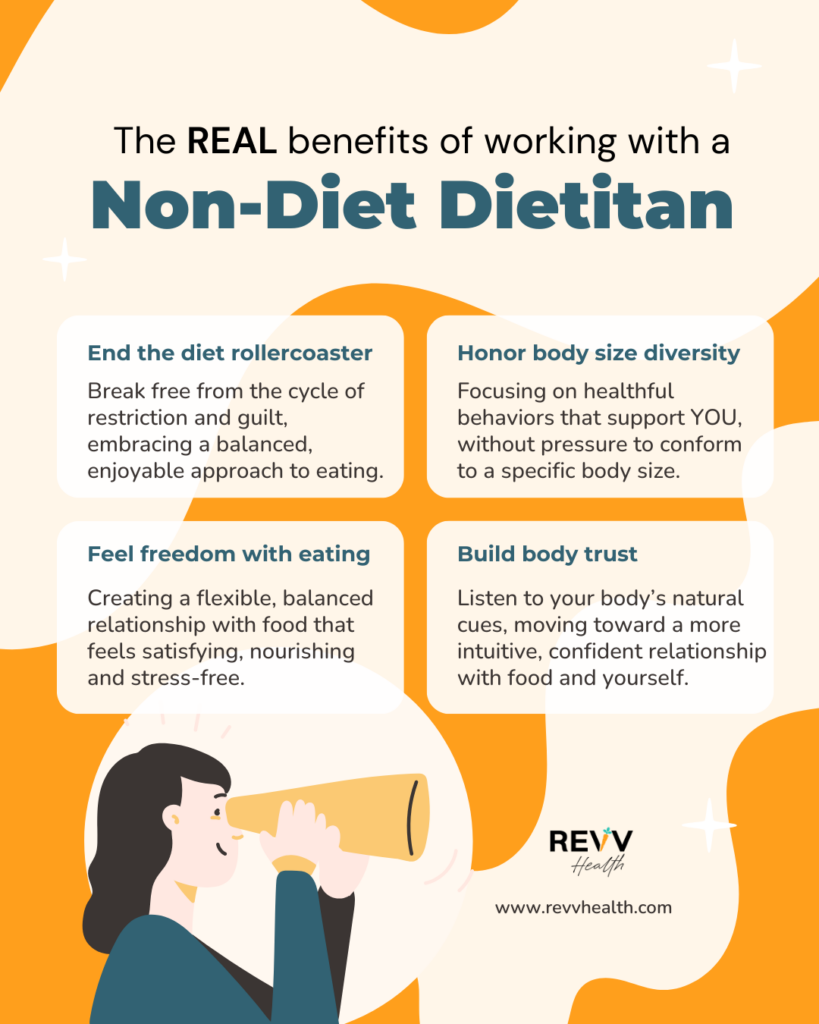
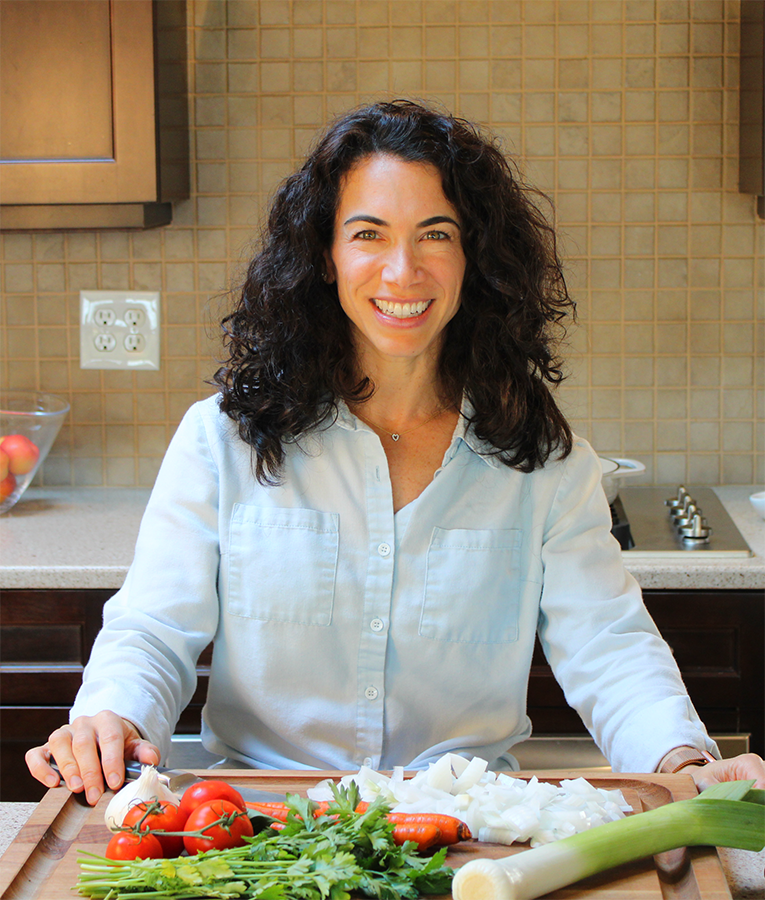
0 Comments